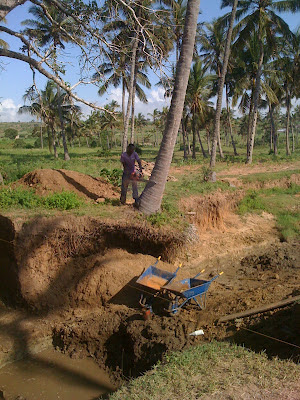Disappointment at ATARC
This morning we arrived at ATARC and were welcomed warmly by the staff. I soon found out, to my shock & disappointment, that one of the pregnant heifers had aborted and none of the six recipients that had received embryos in November were pregnant. I had planned on setting up another group of recipients for transfers in two weeks, but decided that until we could figure out what was going wrong, I wouldn’t put in any more of our embryos. I spent some time trying to find possible causes of the infertility problem we were having, and why a procedure that is straightforward and fairly predictable in the U.S. is giving us trouble in Ethiopia. As I checked the cows, I noticed that their feces was grayish in color and full of little round seeds that the workers identified as acacia seeds. The cows like to eat the pods, especially when the grass is sparse. I observed that their body condition was better than it has ever been, probably a four on a scale of one to ten. I asked where they got water, and the workers told me that the river was about 2 kilometers away. We walked to the river, and passed a pasture that had a lot of non-edible weeds growing in it, but not much good grass left. The river water was low but adequate. These are definitely not ideal conditions for animal health, but they are better than most of the places in Ethiopia.
Joseph and I headed to Debre Zeit and spent most of the drive discussing the enigma of Ethiopia. It has been great having Joseph with me. He is a great young man and incredibly intelligent and mature for his age. We discussed everything from the farming practices here, to the government situation,and how it has affected the agriculture. We have it so good in the United States and most of us don’t realize and appreciate what we have. As a nation, our ignorance and apathy is allowing us to slide away from the core principles that have allowed us to live so well. I only hope and pray that we wake up and see what we have before we throw it all away.
At Genesis farms, Girma showed us around the dairy then shared with me their 2009 production numbers. They are one of the very few dairies that actually has kept those kind of records. The milk production was lower than a US dairy, but all of the other numbers were comparable. As we were leaving, Girma introduced us to the farm manager and I asked him about the possibility of doing some cooperative work. He said that they did want to get something going with embryo transfer. It would be great to work with them.
We drove back to the Tomy hotel and had a good lunch. Joseph had fried chicken and I had spaghetti with meat sauce and we both ordered esprice fruit drinks. It costs 109 birr (US$8.65) for both of us. The head cold that I had been fighting really started to settle in, so we headed back to Addis. The roads were very congested, so it took us over an hour to drive about 40 km, and most of the time we were behind big trucks that spewed black diesel smoke. I was just glad we could pass trucks on either side whenever there was an opening. The road is just two lanes most of the way, but here it is acceptable to drive on the shoulder to pass a truck. This evening Weson served us ingera with sura wot and dura wot, tomato salad, and fried potatoes. She is an excellent cook.

Comments
Post a Comment